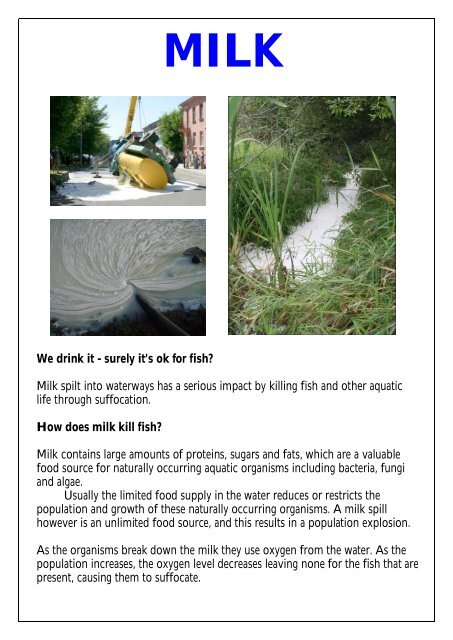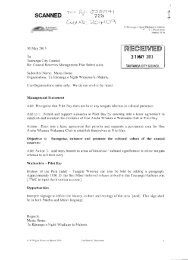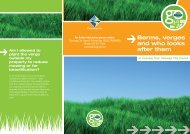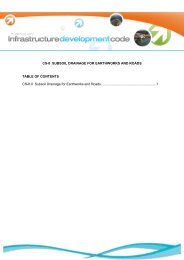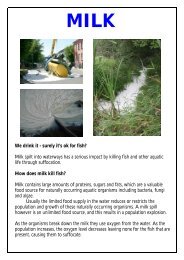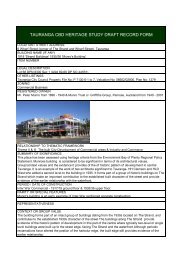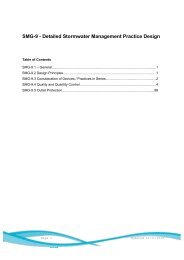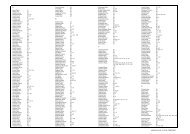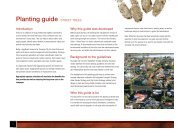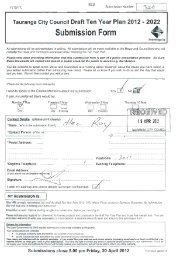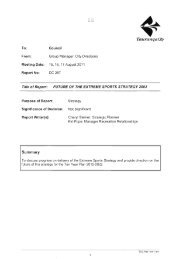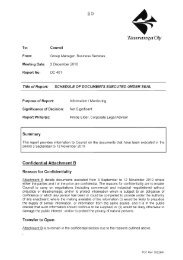Milk spilt into waterways has a serious impact by killing fish and ...
Milk spilt into waterways has a serious impact by killing fish and ...
Milk spilt into waterways has a serious impact by killing fish and ...
Create successful ePaper yourself
Turn your PDF publications into a flip-book with our unique Google optimized e-Paper software.
We drink it - surely it’s ok for <strong>fish</strong>?<br />
MILK<br />
<strong>Milk</strong> <strong>spilt</strong> <strong>into</strong> <strong>waterways</strong> <strong>has</strong> a <strong>serious</strong> <strong>impact</strong> <strong>by</strong> <strong>killing</strong> <strong>fish</strong> <strong>and</strong> other aquatic<br />
life through suffocation.<br />
How does milk kill <strong>fish</strong>?<br />
<strong>Milk</strong> contains large amounts of proteins, sugars <strong>and</strong> fats, which are a valuable<br />
food source for naturally occurring aquatic organisms including bacteria, fungi<br />
<strong>and</strong> algae.<br />
Usually the limited food supply in the water reduces or restricts the<br />
population <strong>and</strong> growth of these naturally occurring organisms. A milk spill<br />
however is an unlimited food source, <strong>and</strong> this results in a population explosion.<br />
As the organisms break down the milk they use oxygen from the water. As the<br />
population increases, the oxygen level decreases leaving none for the <strong>fish</strong> that are<br />
present, causing them to suffocate.
WASTE OI L<br />
We all know waste oil is a pollutant:<br />
Around 30 million litres of waste oil is generated in New Zeal<strong>and</strong> every year.<br />
Much of this is recycled however an unknown quantity ends up in rivers <strong>and</strong> the<br />
sea. One litre of waste oil can cover an area of water the size of an Olympic size<br />
swimming pool <strong>and</strong> could contaminate 1,000,000 litres of drinking water<br />
How does waste oil affect the environment?<br />
Waste oil can directly poison birds, <strong>fish</strong> <strong>and</strong> other organisms. Waste oil can also<br />
form a layer on the surface of <strong>waterways</strong> preventing oxygen <strong>and</strong> sunlight from<br />
entering affecting both aquatic plants <strong>and</strong> animals.<br />
Heavy metals <strong>and</strong> other contaminants in waste oil can accumulate within aquatic<br />
plants <strong>and</strong> animals slowing/stopping their growth or <strong>killing</strong> them over time.
PAINT<br />
What harm does paint cause in <strong>waterways</strong>?<br />
The particles from the paint damage the gills of <strong>fish</strong> <strong>and</strong> make it very difficult for<br />
them to get oxygen. Paint also prevents light from entering the water <strong>and</strong> this<br />
affects plant growth <strong>and</strong> makes it hard for <strong>fish</strong> to find food.<br />
But its “water” based. What’s the problem?<br />
Water-based does not mean environmentally friendly. Any type of paint can<br />
cause <strong>serious</strong> environmental damage <strong>by</strong> poisoning or suffocating aquatic animals<br />
or altering habitats.<br />
Enamel paints (oil-based paints) contain highly toxic solvents which have a<br />
<strong>serious</strong> <strong>impact</strong> on <strong>waterways</strong>. Old lead based paints can be harmful to people as<br />
well as animals. The lead can also build up in the sediment in rivers <strong>and</strong> estuaries<br />
which will remain toxic for hundreds of years.
DETERGENT<br />
It’s just a bit of soapy water – what’s the harm?<br />
Detergents, including biodegradable ones can directly poison aquatic animals, or<br />
make them more susceptible to pollutants <strong>and</strong> disease.<br />
How much?<br />
An estimated 10,000L of detergent enters Tauranga’s <strong>waterways</strong> <strong>and</strong> the sea<br />
every year from car washing. That’s almost 200L (enough to fill ten buckets)<br />
every weekend – just from car washing! That’s enough detergent in one year that<br />
a person could use it to wash their dishes once a day for over 500,000 years!<br />
How does detergent affect aquatic life?<br />
Detergents damage gills <strong>and</strong> destroy the external mucus layers that protect <strong>fish</strong><br />
from bacteria <strong>and</strong> parasites. Even very small amounts of detergent will kill <strong>fish</strong><br />
eggs. Phosphates in detergents can also lead to algal blooms. These algal blooms<br />
can release toxins <strong>and</strong> will <strong>serious</strong>ly deplete oxygen in <strong>waterways</strong> which<br />
suffocates <strong>fish</strong> <strong>and</strong> other aquatic life.
COOKING FATS<br />
AND OILS<br />
Why is fat <strong>and</strong> oil bad for the environment?<br />
Fats <strong>and</strong> oils can directly poison or suffocate <strong>fish</strong> <strong>and</strong> aquatic life. They can also<br />
block light from <strong>waterways</strong> <strong>and</strong> <strong>serious</strong>ly deplete oxygen levels as they break<br />
down causing asphyxiation of aquatic life.<br />
Cooking fat <strong>and</strong> oil is bad for drains!<br />
Don’t tip fat or oil down the sink or any other drains! Fats <strong>and</strong> oils can solidify in<br />
pipes <strong>and</strong> cause blockages. A blocked sewer line could flood your house with<br />
sewage or pollute local streams or the sea. A blocked storm water pipe could<br />
cause <strong>serious</strong> flooding.
MUD AND DIRT<br />
Its only dirty water – what’s the problem?<br />
Sediment is a pollutant. It causes much more harm than most people realise.<br />
Sediment can kill aquatic animals, or make it difficult for them to breathe or find<br />
food. It can choke <strong>waterways</strong> <strong>and</strong> carry more harmful pollutants too. And of<br />
course nobody wants to swim or <strong>fish</strong> in muddy water.<br />
How does dirt cause environmental damage?<br />
Sediment can strip <strong>waterways</strong> of food sources for aquatic animals <strong>and</strong> smother<br />
eggs which <strong>impact</strong>s on the long term survival of species. Sediment also fills in<br />
estuaries <strong>and</strong> can carry other more harmful pollutants such as heavy metals.<br />
Sediment in <strong>waterways</strong> also <strong>has</strong> an <strong>impact</strong> on water treatment <strong>and</strong> supply <strong>and</strong><br />
may increase the cost of drinking water.
FOOD & DRINK<br />
Fish don’t like beer!<br />
Alcohol, milk, blood, meat products, food scraps <strong>and</strong> food industry processing<br />
wastes are all harmful to aquatic ecosystems. They do not “feed <strong>fish</strong>” but will<br />
poison them or remove oxygen from the water resulting in suffocation.<br />
Alcoholic beverages <strong>and</strong> processing wastes contain toxins that can directly<br />
poison aquatic animals.<br />
Food waste suffocates aquatic life!<br />
Food waste of any kind will remove oxygen from <strong>waterways</strong> as it breaks down,<br />
<strong>and</strong> make <strong>waterways</strong> unhealthy for people.<br />
Food waste, even in very small amounts can have an <strong>impact</strong> <strong>and</strong> over time may<br />
kill off particular species <strong>and</strong> change the food web within an ecosystem.
EFFLUENT<br />
Makes good fertilizer right?<br />
Stock effluent that flows or leaches <strong>into</strong> streams <strong>and</strong> ground water is a <strong>serious</strong><br />
pollution problem.<br />
Effluent contains extremely high levels of nutrients which <strong>serious</strong>ly reduce the<br />
oxygen content of <strong>waterways</strong> as they break down. Nutrients also increase algal<br />
<strong>and</strong> weed growth the breakdown of which further reduces the oxygen levels of<br />
<strong>waterways</strong>. Reduced oxygen causes asphyxiation of <strong>fish</strong> <strong>and</strong> other aquatic life.<br />
Sewage from sewer line breaks, blockages <strong>and</strong> overflows will cause <strong>serious</strong><br />
problems in <strong>waterways</strong> as it contains effluent <strong>and</strong> a wide range of other<br />
pollutants such as cleaning chemicals, food waste <strong>and</strong> personal hygiene products.<br />
Effluent is not healthy for <strong>waterways</strong> OR people!<br />
Any effluent discharged <strong>into</strong> <strong>waterways</strong> will carry pathogens <strong>and</strong> bacteria that are<br />
harmful to humans. Drinking water may be contaminated, <strong>waterways</strong> will be<br />
unsafe for swimming <strong>and</strong> shell<strong>fish</strong> may become toxic to humans.
CEMENT<br />
WASH-WATER<br />
Concrete causes burns just like acid does!<br />
Lime is a major component of cement <strong>and</strong> is found in all concrete products.<br />
Cement slurry or water that comes <strong>into</strong> contact with unset concrete or concrete<br />
dust will be highly toxic to aquatic life.<br />
Concrete wastewater <strong>has</strong> a pH of 12 -13 (pH of freshwater is 6-7) <strong>and</strong> is as toxic<br />
as oven cleaner or bleach. Wet cement can cause <strong>serious</strong> burns to people <strong>and</strong> will<br />
burn the gills <strong>and</strong> skin of <strong>fish</strong> causing death.<br />
A single bucket of concrete wastewater is toxic enough to kill hundreds of <strong>fish</strong>.<br />
Cement blocks pipes too.<br />
Cement washed <strong>into</strong> drains can harden <strong>and</strong> cause blockages. This causes damage<br />
that often results in flooding or sewer overflows.
Tidy Kiwis?<br />
RUBBISH<br />
Everyday thous<strong>and</strong>s of items of rubbish are discarded or are washed <strong>into</strong> streams<br />
<strong>and</strong> the sea. This includes food wrappers, plastic bags, glass, paper, plastic<br />
bottles, cans, cigarette butts <strong>and</strong> much else besides. Some of these items may<br />
take over 500 years to break down.<br />
Rubbish is a killer!<br />
Rubbish can be toxic <strong>and</strong> can directly poison aquatic animals or make <strong>waterways</strong><br />
too polluted to support any life. It is estimated that up to 100,000 marine<br />
mammals (dolphins, seals, whales etc) <strong>and</strong> up to 1,000,000 sea birds are killed<br />
every year worldwide after becoming tangled in or from injesting rubbish like<br />
plastic bags, plastic tape, <strong>and</strong> old <strong>fish</strong>ing lines <strong>and</strong> nets.<br />
Rubbish - Its not only ugly, it’s a health hazard too.<br />
Sharp objects like glass can cause injury <strong>and</strong> other rubbish such as food <strong>and</strong><br />
medical waste can cause infection <strong>and</strong> disease. Rubbish makes water unhealthy<br />
for drinking or for swimming in.<br />
Rubbish also blocks drains <strong>and</strong> <strong>waterways</strong> which can cause flooding.
CIGARETTE<br />
BUTTS<br />
Its only one cigarette butt…<br />
Every single day in Tauranga thous<strong>and</strong>s of cigarette butts are littered. People<br />
flick them out of their cars, stub them out on the footpath or throw them<br />
directly <strong>into</strong> drains. Most of these wash <strong>into</strong> streams or the sea.<br />
How many?<br />
In Tauranga around 60,000 cigarette butts are littered each day. An estimated<br />
23, 816, 250 cigarette butts each year that end up in streams <strong>and</strong> the sea. That’s<br />
an astounding 4 tonnes of dirty cigarette butts, enough to fill ten rubbish trucks.<br />
If you lined up end to end, all the cigarette butts littered <strong>by</strong> New Zeal<strong>and</strong><br />
smokers in one year, the line would stretch around the earth 35 times!!!<br />
They can’t be that harmful though…can they?<br />
Cigarette filters are made of cellulose acetate <strong>and</strong> they can take over 3 years to<br />
break down. The amount of nicotine in 200 cigarette butts is enough to kill a<br />
human being - think what it does to aquatic animals. Cigarette butts leach toxic<br />
chemicals like cadmium, lead <strong>and</strong> arsenic <strong>into</strong> our <strong>waterways</strong>. Cigarette butts can<br />
also poison <strong>fish</strong> <strong>and</strong> birds that ingest them.
ROAD RUNOFF<br />
What’s really on our roads….<br />
Vehicles cause <strong>serious</strong> pollution <strong>and</strong> although your car may only cause a very<br />
small amount it all adds up! An average road surface is likely to be contaminated<br />
with dirt, grease, oil, petrol, diesel, brake fluid, hydraulic oil, antifreeze, rubber,<br />
detergent, food scraps, cigarette butts, rubbish, organic waste, heavy metals like<br />
zinc, copper, chromium, lead <strong>and</strong> any number of other contaminants.<br />
Where does it go when it rains?<br />
All the pollutants are washed directly <strong>into</strong> streams, rivers, groundwater systems,<br />
lakes <strong>and</strong> the sea. There is usually no treatment of road runoff. This adds up to<br />
many tonnes of pollutants entering our <strong>waterways</strong> every year.<br />
These pollutants have a wide range of <strong>impact</strong>s on ecosystems but can cause<br />
<strong>serious</strong> long term damage as they slowly accumulate in marine organisms <strong>and</strong><br />
sediments.
BIODEGRADABLE<br />
PRODUCTS<br />
“BIODEGRADABLE” does not mean “environmentally friendly”!<br />
Most people assume a “biodegradable” product will quickly break down <strong>and</strong><br />
therefore cause little harm to the environment – this is not necessarily the case.<br />
Biodegradable simply means that the product will be broken down over time <strong>by</strong><br />
environmental processes. For example ethanol is biodegradable but also highly<br />
toxic.<br />
Many “biodegradable” products such as detergents <strong>and</strong> other cleaners are toxic<br />
<strong>and</strong> initially damage the environment in the same way as non-biodegradable<br />
products.<br />
Some “biodegradable” products take months or years to degrade <strong>and</strong> can remove<br />
oxygen from <strong>waterways</strong> <strong>and</strong> may even produce more harmful substances as they<br />
break down. For example the toxic pesticide DDT biodegrades to the<br />
compounds DDD <strong>and</strong> DDE, both of which are more toxic than the original<br />
DDT itself.<br />
Biodegradable or not - Keep all chemicals, wastes <strong>and</strong> rubbish out of<br />
stormwater drains, <strong>waterways</strong> <strong>and</strong> the sea.


